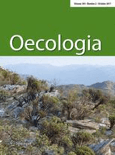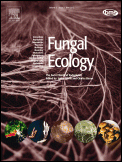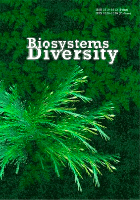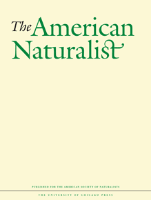
Theoretical Ecology
Scope & Guideline
Pioneering new frontiers in ecological modeling.
Introduction
Aims and Scopes
- Mathematical Modeling of Ecological Dynamics:
The journal emphasizes the creation and application of mathematical models to represent ecological interactions, population dynamics, and community structures. These models help in predicting the behavior of ecosystems under various conditions. - Interdisciplinary Approaches to Ecology:
Theoretical Ecology incorporates methodologies from various disciplines such as mathematics, computer science, and biology to address complex ecological questions, making it a platform for innovative research that blends theory with practical applications. - Focus on Population and Community Ecology:
Research often centers around population dynamics, species interactions, and community stability, exploring themes such as coexistence, competition, and the effects of environmental changes on ecological communities. - Ecosystem Responses to Environmental Changes:
The journal investigates how ecosystems respond to both natural and anthropogenic changes, including climate change, habitat loss, and resource exploitation, contributing to a deeper understanding of resilience and adaptation. - Evolutionary Ecology and Eco-evolutionary Dynamics:
It also explores the intersection of ecological and evolutionary processes, focusing on how evolutionary changes can impact ecological dynamics and vice versa.
Trending and Emerging
- Climate Change Impacts on Ecosystems:
There is an increasing focus on modeling how climate change affects ecological dynamics and species interactions, reflecting the urgency of understanding ecosystem resilience and adaptation in the face of global environmental change. - Non-linear Dynamics and Thresholds:
Research on non-linear dynamics and critical thresholds in ecosystems is gaining traction, highlighting the importance of understanding tipping points and regime shifts within ecological systems. - Complex Food Web Interactions:
Emerging studies are delving deeper into the complexities of food webs, examining the roles of omnivory, indirect interactions, and stability, which are essential for understanding ecosystem function and resilience. - Behavioral Ecology and Population Responses:
There is a growing interest in incorporating behavioral responses of species into ecological models, recognizing that behavior can significantly influence population dynamics and community interactions. - Integration of Evolutionary Processes in Ecology:
The integration of evolutionary dynamics into ecological models is becoming more prominent, emphasizing the interconnectedness of ecological and evolutionary processes and how they shape community structures and species interactions.
Declining or Waning
- Traditional Static Models:
There has been a noticeable decline in the use of traditional static models that do not account for dynamic interactions over time. The current trend favors more complex, dynamic models that reflect the temporal variability and interactions within ecosystems. - Deterministic Approaches:
The reliance on deterministic models is waning as researchers increasingly recognize the importance of stochastic processes and uncertainty in ecological systems. This shift reflects a broader understanding of ecological complexity. - Simplistic Species Interaction Models:
Research focusing solely on simple pairwise species interactions is decreasing. There is a growing emphasis on multi-species interactions and network dynamics, indicating a move towards more holistic ecological models. - Local Scale Studies:
While local ecological studies are still relevant, there is a declining trend in papers that focus exclusively on local scale interactions without considering broader spatial or temporal scales, as researchers aim to understand larger ecological patterns.
Similar Journals

ECOLOGICAL RESEARCH
Connecting researchers to shape the future of ecological science.ECOLOGICAL RESEARCH is a prestigious academic journal published by WILEY, dedicated to advancing the field of ecology and its associated disciplines. Since its inception in 1986, the journal has consistently provided a platform for high-quality, peer-reviewed research, contributing significantly to the understanding of ecological systems and their complexities. With an impressive 2023 impact factor reflected in its Q1 ranking in the category of Ecology, Evolution, Behavior, and Systematics, it stands among the top journals in its field, as evidenced by its Scopus rank of #192 out of 721 and placement in the 73rd percentile. While accessible through standard subscription models, this journal plays an essential role in disseminating crucial findings and innovative methodologies to researchers, professionals, and students alike. With a commitment to fostering ecological knowledge and collaboration, ECOLOGICAL RESEARCH continues to influence ecological practices and policies, shaping the future of research in this critical area.

OECOLOGIA
Elevating Ecological Knowledge for Tomorrow's ChallengesOECOLOGIA is a prestigious journal dedicated to the interdisciplinary fields of ecology, evolution, behavior, and systematics, published by Springer. Established in 1968, this journal has consistently contributed to the scientific community, maintaining a strong impact factor reflected in its Q1 ranking within its category for 2023, and an impressive 79th percentile among 721 journals in the Scopus rank for Agricultural and Biological Sciences. With a commitment to advancing ecological knowledge and fostering innovative research, OECOLOGIA serves as a vital platform for researchers, professionals, and students exploring complex ecological dynamics and evolutionary processes. Although it does not offer open access, the journal remains dedicated to high-quality, peer-reviewed publications that inspire and inform the next generation of ecological science. For those interested in the latest trends and significant findings in biology and ecology, OECOLOGIA is an essential resource that continues to shape the discourse and understanding in these critical fields.

Annual Review of Ecology Evolution and Systematics
Bridging Theory and Practice in Ecological SciencesThe Annual Review of Ecology, Evolution, and Systematics, published by Annual Reviews, is a leading academic journal dedicated to advancing the understanding of ecological and evolutionary processes. With a commendable impact factor and impressive rankings—9th in both the Ecology, Evolution, Behavior and Systematics category and the Environmental Science category—this journal is recognized for its rigorous peer-reviewed articles that synthesize research findings across a wide range of topics within the fields of ecology and evolutionary biology. Established in 2003, this annual publication aims to provide researchers, professionals, and students with comprehensive insights into the latest developments and trends within these dynamic disciplines. By facilitating access to high-quality scholarly articles, the Annual Review of Ecology, Evolution, and Systematics continues to play a crucial role in fostering scientific discourse and discovery.

Fungal Ecology
Illuminating the Role of Fungi in EcosystemsFungal Ecology, published by Elsevier Science Ltd, is a leading international journal dedicated to the exploration and advancement of our understanding of fungal biology and its ecological significance. With an impressive impact factor and recognized in the second quartile (Q2) across various categories such as Ecological Modeling, Ecology, Ecology, Evolution, Behavior and Systematics, and Plant Science, this journal offers a critical platform for researchers and professionals to disseminate and discuss innovations in fungal ecology. Since its inception in 2008, the journal has built a solid reputation, particularly highlighted by its impressive Scopus rankings, including a top percentile status in ecological fields. Researchers are encouraged to submit their findings that contribute to the understanding of the ecological roles of fungi, their interactions within ecosystems, and their applications in environmental science. Although the journal does not offer open access, it remains a vital resource for academics and practitioners aiming to stay ahead in the rapidly evolving fields of fungal research and ecology. Located in the vibrant heart of the Netherlands, the journal continues to foster scholarly engagement and collaboration among scientists globally.

Ecological Complexity
Pioneering research for a deeper ecological understanding.Ecological Complexity is a prestigious academic journal published by Elsevier, dedicated to advancing the understanding of complex ecological systems through innovative modeling and analysis. With an ISSN of 1476-945X and an E-ISSN of 1476-9840, this journal has been a critical platform for researchers since its inception in 2004, with a forecasted operation until 2024. The journal enjoys an esteemed Q2 ranking in both the Ecological Modeling and Ecology, Evolution, Behavior and Systematics categories as of 2023, highlighting its significant impact and relevance in the field. Additionally, it ranks impressively in Scopus, with 85th out of 721 in the Ecology category and 11th out of 41 in Ecological Modeling, illustrating its commitment to high-quality research dissemination. While it does not currently offer Open Access options, Ecological Complexity remains a vital resource for ecologists, environmental scientists, and interdisciplinary researchers aiming to deepen their understanding of ecological interactions and systems. The journal is based in the Netherlands at RADARWEG 29, 1043 NX, AMSTERDAM, and serves as an essential forum for fostering innovative research that bridges theoretical concepts and practical applications in ecology.

FOLIA GEOBOTANICA
Uncovering the past to illuminate the future of plant ecology.FOLIA GEOBOTANICA, published by Springer, is a distinguished journal dedicated to advancing the fields of Paleontology and Plant Science through the dissemination of high-quality research. With an ISSN of 1211-9520 and an E-ISSN of 1874-9348, this journal has been pivotal in providing a platform for innovative studies from 1994 to 2024. Notably, FOLIA GEOBOTANICA holds a Q3 ranking in Paleontology and a Q2 ranking in Plant Science as of 2023, affirming its relevance and contribution to the scholarly community. The journal is located in the Netherlands at VAN GODEWIJCKSTRAAT 30, 3311 GZ DORDRECHT, and is not an Open Access publication, ensuring comprehensive review processes and scholarly integrity. With Scopus rankings that place it in the 50th percentile for Plant Science and 46th for Paleontology, FOLIA GEOBOTANICA continues to attract researchers, professionals, and students who are keen to explore the intricacies of plant ecology and fossil records, thereby fostering a deeper understanding of ecological and evolutionary patterns.

Biosystems Diversity
Fostering Insights into Biological ComplexityBiosystems Diversity is an esteemed open access journal published by the Oles Honchar Dnipro National University since 2009, based in Ukraine. Focusing on a wide array of topics within the fields of Ecology, Evolution, Behavior, and Systematics, the journal aims to foster the dissemination of cutting-edge research and innovative methodologies in understanding biodiversity and ecological interactions. With its ISSN 2519-8513 and E-ISSN 2520-2529, Biosystems Diversity has seen a consistent growth trajectory, earning a Q3 category for Ecology and a Q4 classification for Ecology, Evolution, Behavior and Systematics as of 2023, reflecting its dedication to high standards of scholarly excellence. The journal's rankings in Scopus solidify its relevance in the academic community, providing researchers and practitioners with vital insights into contemporary environmental challenges. As it converges towards its 2024 target, Biosystems Diversity continues to empower scientists, students, and professionals alike to explore new dimensions in the study of biological systems, offering crucial open access options for broader reach and engagement.

RUSSIAN JOURNAL OF ECOLOGY
Advancing Knowledge in Ecological Research and InnovationRUSSIAN JOURNAL OF ECOLOGY, published by PLEIADES PUBLISHING INC, stands as a critical resource within the field of ecology, offering an array of research insights that span various ecological topics. With an ISSN of 1067-4136 and an E-ISSN of 1608-3334, this journal has been consistently disseminating knowledge since its inception in 1996, now converging towards 2024. Despite its current Q4 ranking in the Ecology, Evolution, Behavior and Systematics category, the journal has carved out a niche in the publication landscape, particularly for scholars focused on the rich and diverse ecological phenomena of Russia and surrounding territories. The journal aims to foster interdisciplinary collaboration and innovation by providing a platform for the dissemination of high-quality research. While it currently lacks open access options, readers can expect in-depth studies and analytical discourses that contribute meaningfully to the global understanding of ecological systems. With an impressive Scopus rank, this journal remains an important outlet for researchers, professionals, and students committed to advancing ecological science.

AMERICAN NATURALIST
Connecting Scholars through Natural InsightsAMERICAN NATURALIST, published by University of Chicago Press, stands as a premier outlet for scholarly research in the fields of ecology, evolution, behavior, and systematics. With an impact factor that reflects its high citation rate, the journal has garnered a reputation within the academic community, evidenced by its placement in the Q1 category of its discipline in 2023 and an impressive Scopus rank of #135 out of 721 journals, positioning it in the 81st percentile for Agricultural and Biological Sciences. The journal, established in 1946, continues to uphold its commitment to advancing scientific knowledge through rigorous peer-reviewed articles. Researchers and professionals will find AMERICAN NATURALIST an essential resource, providing insights and discussions that illuminate complex biological phenomena, while fostering a deeper understanding of the natural world. As an essential reading for students and seasoned experts alike, its curated body of work encourages innovative thinking and exploration across an array of ecological and evolutionary topics.

Neotropical Biodiversity
Championing biodiversity for a sustainable tomorrow.Neotropical Biodiversity is a prominent journal dedicated to advancing our understanding of biodiversity and ecological dynamics within the Neotropical region. Published by TAYLOR & FRANCIS LTD in the United Kingdom, this Open Access journal has been providing unrestricted access to research findings since 2015, fostering collaboration and knowledge sharing among the global scientific community. With an emphasis on innovative research in Ecology, Ecology, Evolution, Behavior and Systematics, and Global and Planetary Change, it has earned a reputation for excellence, currently holding a Q3 category in its field. As of 2023, the journal ranks in the 37th percentile for Environmental Science (Ecology) and in the 36th percentile for Agricultural and Biological Sciences (Ecology, Evolution, Behavior and Systematics), making it a valuable resource for researchers, professionals, and students interested in understanding and preserving biodiversity in one of the world's most diverse ecosystems. We invite you to explore the cutting-edge research published in Neotropical Biodiversity and contribute to the ongoing dialogue for environmental sustainability and ecological resilience.